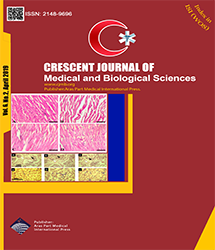
| Original Article | |
| Combined Preconditioning With Cinnamon Extract and Aerobic Training Reduce Oxidative Stress in a Rat Model of Myocardial Reperfusion Injury | |
| Aniseh Javadi1,2, Reza Badalzadeh3,4, Narges Zolfagharzadeh4,5, Sara Adeli Shahir4 | |
| 1Drug Applied Research Center, Tabriz University of Medical Sciences, Tabriz, Iran 2Student Research Committee, Tabriz University of Medical Sciences, Tabriz, Iran 3Molecular Medicine Research Center, Tabriz University of Medical Sciences, Tabriz, Iran 4Immunology Research Center, Tabriz University of Medical Sciences, Tabriz, Iran 5Department of Biochemistry, Payam Noor University, Tehran, Iran |
|
|
CJMB 2019; 6: 214-220 Viewed : 5864 times Downloaded : 15744 times. Keywords : Myocardial reperfusion injury, Oxidative stress, Cinnamon, Aerobic exercise, Antioxidant |
|
| Full Text(PDF) | Related Articles | |
| Abstract | |
Objectives: Ischemic heart disease is the principal cause of mortality worldwide. Using natural strategies to prevent this disease is very important. Therefore, the current study aimed to evaluate the combined effects of the cinnamon extract and aerobic exercise on oxidative stress following myocardial ischemia/reperfusion (I/R) injury. Materials and Methods: Male Wistar rats weighing 250-300 g were randomly divided into 4 groups (6 rats each) including control, cinnamon extract, aerobic exercise, and a combination of cinnamon and exercise. The aerobic exercise was performed on a treadmill and the cinnamon extract was administered by gavage for a month. In addition, the isolated hearts of the rats received global ischemia (30 minutes) and reperfusion (60 minutes) in order to induce I/R injury. Lactate dehydrogenase (the indicator of tissue damage), the marker of lipid peroxidation (malondialdehyde), and antioxidative enzymes (i.e., superoxide-dismutase and glutathione-peroxidase) were measured with specific kits and spectrophotometric methods on samples obtained from the ischemic tissues. Results: Based on the results, lactate dehydrogenase level significantly decreased in the group receiving a combination of cinnamon and aerobic exercise compared to the control group (P < 0.05). Further, both aerobic exercise and cinnamon extract significantly increased the values of antioxidant enzymes and this effect was greater in combination therapy compared to the individual treatments. However, the amount of malondialdehyde in the exercise group and in the combined treatment significantly reduced compared to that of the control groups (P < 0.05). Conclusions: A combination of aerobic training with cinnamon supplementation had better cardioprotective influences. Accordingly, cinnamon may increase the aerobic exercise potency in enhancing the heart antioxidant capacity against oxidative insult in reperfusion injury. |
Cite By, Google Scholar
Google Scholar
PubMed
Online Submission System
 CJMB ENDNOTE ® Style
CJMB ENDNOTE ® Style
 Tutorials
Tutorials
 Publication Charge
Medical and Biological Research Center
About Journal
Publication Charge
Medical and Biological Research Center
About Journal
Aras Part Medical International Press Editor-in-Chief
Arash Khaki
Deputy Editor
Zafer Akan


















